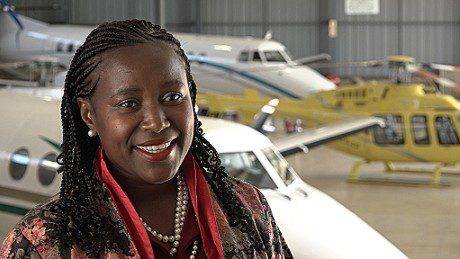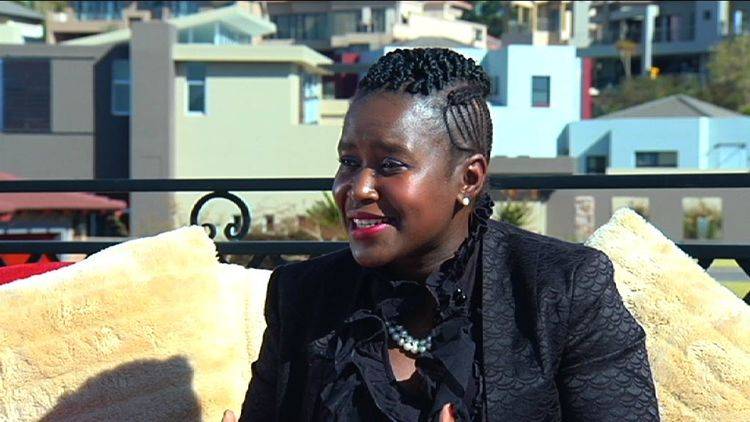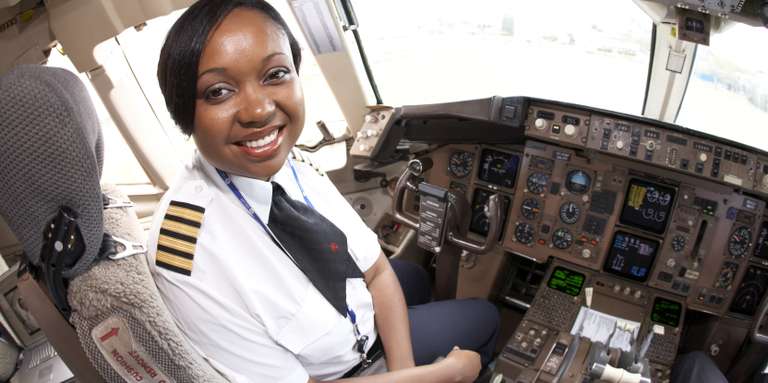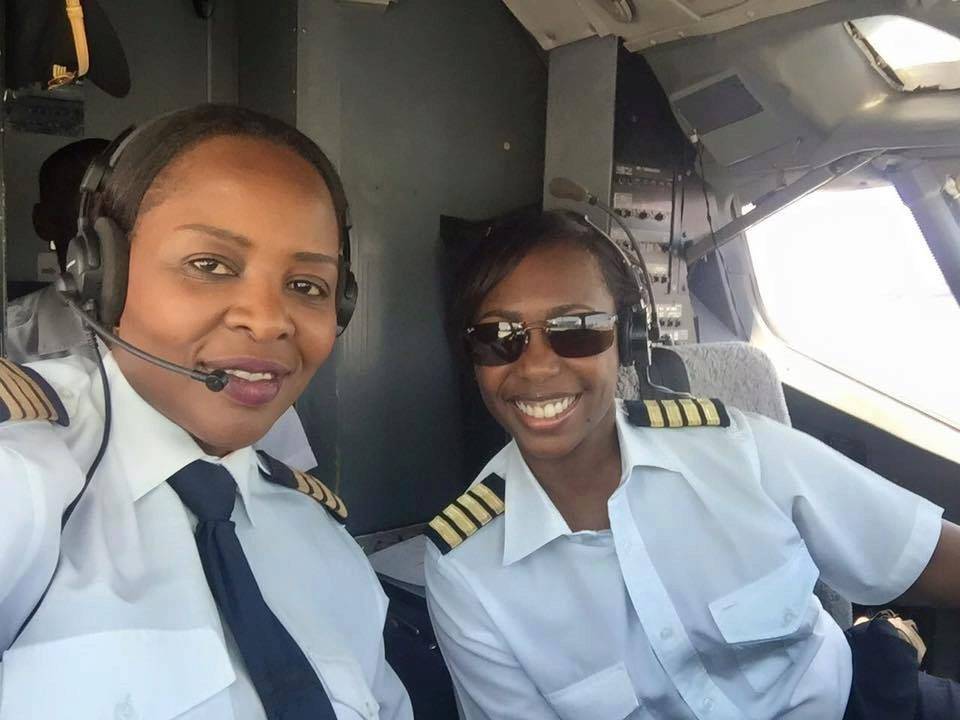One Woman’s Dashed Air Hostess Dream Resulted In Africa’s First Female-Owned Aviation Company

As was the case for most kids her age, Sibongile Sambo would run for it whenever it sounded like there was an airplane hovering overhead. She would step outside her home in Bushbuckridge, Mpumalanga, in South Africa, and try to catch a glimpse of this very fascinating flying object, eagerly waving goodbye as though she could be seen from thousands of feet away, and making silent childish wishes as though it were a shooting star.
Actually, unlike most kids, her own silent wishes didn’t dwell on bags of goodies and all that stuff. It was her wish to fly in those planes herself to different parts of the world, see new places, and meet new people.
Turns out that those aeroplanes in the night sky are like shooting stars, after all, and we all could probably use a wish at this moment. And that’s because her wishes did come through in more ways than one.

Source: cnn.com
Today, the name Sibongile Sambo, apart from having a nice ring to it, is associated with a lot of firsts and wins, and perhaps none is more vocal than the fact that the little girl from Mpumalanga has not only built the first wholly black-female-owned aviation company in South Africa but also made it her life’s work to help more women touch the skies.
Having fallen in love with hovering several miles above sea level and travelling to different parts of the world from a very young age, Sibongile had grown up holding on to one dream – to become a Flight Attendant for South African Airways.
And when it dawned on her that she’d probably never make the cut because she just wasn’t tall enough, she knew there was only one other way she could get involved in the industry she was so passionate about, however crazy and unlikely the mere thought of that ‘other way’ seemed.
She took the South African Airways disappointment in her stride and forged ahead, making a switch to the human resources environment where she had stints at De Beers and City Power for a while. But her desire for the aviation sector never waned.
At the slightest whiff of opportunity, she was at the ready; quite willing to sacrifice everything to bring her dreams to life.

This slight whiff of opportunity came in 2003 when the South African government passed the Black Economic Empowerment Act. The provisions of the Act enabled individuals from previously disadvantaged backgrounds to make big plays in the country’s economy as entrepreneurs. And even though, Sibongile didn’t exactly grasp the full ramifications of the new statute, the whole thing just seemed like the perfect time to make the move.
So, she embarked on a quest to fulfil her aviation dreams but first, there was the not-so-small matter of sector experience and sufficient take-off capital – things she didn’t exactly have. But she was so determined to go through with the whole thing that neither her own inadequacies nor funding difficulties could get in the way of her dreams.
To raise just enough capital to be able to make an initial foray, she sold her car, got a loan from an aunt, and used up her mother’s pension. For the other part; that is, industry experience and know-how, it was always going to be a ‘learn-the-ropes-as-you-climb’ affair.
This way, she got her business started; brokering contracts between aviation services and those with air-transport needs.
It was a slow start that didn’t amount to much initially but, at least, she knew she very close to where she’d always wanted to be and perhaps with some help or by some stroke of good fortune, she could get even closer.
And soon, the stars did begin to align in her favour. Her first real breakthrough in the aviation sector came when she won a tender issued by the South African government to aviation firms asking for bids on a contract for cargo transport. She won the tender by aligning her small aviation brokering firm which she now called SRS Aviation with another company.
It seemed like the golden opportunity she had been waiting for – and maybe it was – but she did get the wind knocked out of her sails when the other company she was looking to collaborate with on the project pulled out of the deal. As things stood, the only way to get around the situation was by learning the contracting process and pulling it off on her own.
Not one to be taken off course by a storm, she kept her head in the game and it wasn’t long before lines began to fall in pleasant places for her. In 2004, Sibongile was commissioned with her first flight for the South African government.
In 2006, following an inspection of her company’s infrastructure by the South African Civil Aviation Authority (CAA), which ascertained that her company, SRS Aviation, had safe and airworthy aircraft among other requirements, her company was issued with a formal Air Operating Certificate.

This was a milestone that saw her company become the first completely female-owned aviation company in Africa. SRS aviation also became the first black operational enterprise in South Africa to be given full rights to undertake commercial flying activities.
Sometime in June 2010, Sibongile’s SRS Aviation opened its first shop at one of South Africa’s busiest airports and that was just the first of a chain of retail stores that have since been opened across the country’s airport networks between then and now.
The company has grown to provide personalized services including helicopter, tourist and luxury flights to destinations spanning the globe. The Johannesburg-based crew have flown as far as the U.S. and Germany.
“It could be a tourist charter for USD 1 K or could be a head-of-state traveling on a VIP aircraft to the United States, which could be about USD 200 K,” the entrepreneur once told CNN.
It sure looks like business is good these days but pound-for-pound, there’s been more of turbulent times. Stern challenges have arisen at different points, especially in the areas of “learning the lingo,” and dealing with gender stereotypes in what is, by and large, a male-dominated field.
But in spite of these difficulties, she’s remained a high-flyer with the license from the CAA easily one of her bigger achievements. Also, she’s helped several women get their private pilot licenses, most of whom are now employed full-time.

In 2015, Ethiopian Airlines dispatched its first ever flight run by an entirely female crew in an effort to encourage more African women into aviation. In the same vein, Sibongile wants to encourage and support more South African women to get in on the act and make it big as jet pilots.
“I’m where I am today because somebody invested in me,” she says. “It’s my opportunity now to invest in other people.”
SRS Aviation has also partnered with MCC Aviation; a key player in the South African aviation space. The deal affords Sibongile access to a fleet of aircraft, as well as technical and operational support. There also talks of expanding SRS Aviation helicopter services and its operations across the African continent.
In the years past, Sibongile has built a pedigree for identifying new opportunities and making the most of them for the benefit of her business. Her ability to network has also helped her to become a successful entrepreneur in the South African aviation industry; not the easiest of places to do business.
Besides entrepreneurship, Sibongile is also a well-known motivational speaker, mentoring youngsters, as well as other businessmen and women in Africa, while helping to create much-needed opportunities and empowering women from previously disadvantaged backgrounds.
Featured Image Courtesy: lionessesofafrica.com